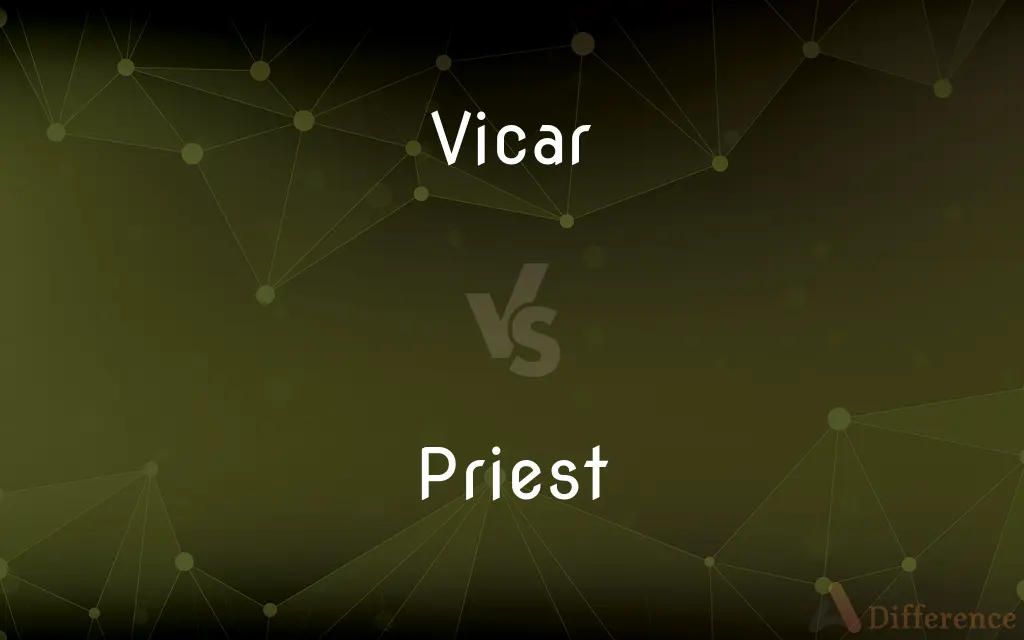Vicar vs. Priest — What's the Difference?
By Tayyaba Rehman — Updated on May 27, 2024
A vicar is a representative of a bishop, often responsible for a parish, while a priest is an ordained minister of the Christian Church authorized to perform religious rituals and give blessings.

Difference Between Vicar and Priest
Table of Contents
ADVERTISEMENT
Key Differences
A vicar, in its broadest sense, represents someone who serves as a substitute or agent. In the context of the Church of England and some other Anglican churches, a vicar is a parish priest appointed by the bishop. They act on behalf of the bishop and are responsible for their respective parishes. On the other hand, a priest, a broader term in Christian denominations, is someone who has been ordained to perform religious rites, preach, and administer sacraments.
In Roman Catholicism, the term "vicar" takes on various specific roles. For example, the Pope, as the Bishop of Rome, has under him the Vicar General of Rome. This vicar oversees the pastoral care of the diocese of Rome on behalf of the Pope. A priest in Catholicism, meanwhile, can be anyone ordained to the second highest order of the ministry, having the authority to celebrate Mass and forgive sins.
The title of "vicar" isn't universally used across all Christian denominations. Its application and meaning can differ. In contrast, the term "priest" is more universally recognized, denoting someone ordained in a religious capacity in various Christian traditions, from Eastern Orthodoxy to Anglicanism to Catholicism.
Understanding the nuance between vicar and priest is key. While all vicars (in the context of Anglican churches) are priests, not all priests are vicars. A vicar is defined by their role in representing the bishop and managing a parish, while a priest's definition hinges on their ordination and religious capacities.
Comparison Chart
Definition
A representative of a bishop in a parish
An ordained minister in the Christian Church
ADVERTISEMENT
Ordination
Always ordained
Always ordained
Role
Primarily parish-focused, acting on behalf of the bishop
Can function in various capacities, including parish work
Usage
Specific to certain Christian denominations (e.g. Anglican)
Universally recognized across Christian denominations
Position
Often specific to a parish
Can range from parish priest to higher ecclesiastical authorities
Compare with Definitions
Vicar
An Anglican parish priest in charge of a church.
The community held a celebration in honor of the new vicar's arrival.
Priest
A priest is a religious leader authorized to perform the sacred rituals of a religion, especially as a mediatory agent between humans and one or more deities. They also have the authority or power to administer religious rites; in particular, rites of sacrifice to, and propitiation of, a deity or deities.
Vicar
A vicar (; Latin: vicarius) is a representative, deputy or substitute; anyone acting "in the person of" or agent for a superior (compare "vicarious" in the sense of "at second hand"). Linguistically, vicar is cognate with the English prefix "vice", similarly meaning "deputy".
Priest
Someone authorized to perform religious rituals and ceremonies.
The priest blessed the couple during their wedding ceremony.
Vicar
An Anglican parish priest in a parish where historically someone other than the priest was entitled to the tithes.
Priest
A person with special authority to teach or administer religious rites.
The priest was consulted before the village's annual religious festival.
Vicar
A clergyman in certain Christian denominations.
As a vicar, she was responsible for the spiritual wellbeing of her parish.
Priest
An ordained minister of the Christian Church.
The priest gave a heartfelt sermon on faith and perseverance.
Vicar
(in the Church of England) an incumbent of a parish where tithes formerly passed to a chapter or religious house or layperson.
Priest
A mediator between God and humankind in various religions.
As a priest, he felt it was his duty to guide his congregation to salvation.
Vicar
A cleric in charge of a chapel in the Episcopal Church of the United States.
Priest
An individual who offers sacrifices and leads worship in religious traditions.
The priest conducted the ritual, ensuring every detail was perfect.
Vicar
An Anglican or Roman Catholic cleric who acts for or represents another, often higher-ranking member of the clergy.
Priest
An ordained minister of the Catholic, Orthodox, or Anglican Church, authorized to perform certain rites and administer certain sacraments
The priest celebrated mass at a small altar off the north transept
Vicar
In the Church of England, the priest of a parish, receiving a salary or stipend but not tithes.
Priest
A mallet used to kill fish caught when angling.
Vicar
In the Roman Catholic and some other churches, a cleric acting as local representative of a higher ranking member of the clergy.
Priest
Ordain to the priesthood
He was made deacon in 1990 and priested in 1994
Vicar
A person acting on behalf of, or representing, another person.
Priest
In many Christian churches, a member of the second grade of clergy ranking below a bishop but above a deacon and having authority to administer the sacraments.
Vicar
One deputed or authorized to perform the functions of another; a substitute in office; a deputy.
Priest
A person having the authority to perform and administer religious rites.
Vicar
The incumbent of an appropriated benefice.
Priest
To ordain or admit to the priesthood.
Vicar
(Episcopal Church) a clergyman in charge of a chapel
Priest
A religious clergyman (clergywoman, clergyperson) who is trained to perform services or sacrifices at a church or temple
The priest at the Catholic church heard his confession.
The Shinto priest burnt incense for his ancestors.
The Israelite priests were descended from Moses' brother Aaron.
Vicar
(Church of England) a clergyman appointed to act as priest of a parish
Priest
(Mormonism) the highest office in the Aaronic priesthood
Vicar
Someone acting as a substitute or agent.
The king's vicar handled the daily affairs of the kingdom during his absence.
Priest
A presbyter elder; a minister
Vicar
The priest of a parish receiving tithes.
The vicar used the collected tithes to support the church's outreach programs.
Priest
To ordain as priest.
Vicar
A Roman Catholic priest who acts for another higher-ranking clergyman
Priest
A clergyman in Christian churches who has the authority to perform or administer various religious rites; one of the Holy Orders
Vicar
A representative of the bishop in a parish.
The vicar led Sunday services at the local church.
Priest
A spiritual leader in a non-Christian religion
Priest
A blunt tool, used for quickly stunning and killing fish
Priest
(transitive) To ordain as a priest.
Priest
One who officiates at the altar, or performs the rites of sacrifice; one who acts as a mediator between men and the divinity or the gods in any form of religion; as, Buddhist priests.
Then the priest of Jupiter . . . brought oxen and garlands . . . and would have done sacrifice with the people.
Every priest taken from among men is ordained for men in things pertaining to God, that he may offer both gifts and sacrifices for sins.
Common Curiosities
What is a vicar?
A vicar is a clergyman, typically in the Church of England, who acts as a representative of the bishop, often responsible for a parish.
How does a vicar differ from a priest?
While all vicars are priests, not all priests are vicars. A vicar is defined by their specific role in representing the bishop and overseeing a parish, whereas a priest is an ordained minister of the Christian Church.
Can a woman be a vicar or a priest?
Yes, in many Christian denominations, including the Church of England and certain parts of the Anglican Communion, women can be ordained as both vicars and priests.
Is the term "vicar" used in Catholicism?
Yes, but its application is different. In Catholicism, you might hear terms like "Vicar General" or "Papal Vicar," which denote specific roles within the church hierarchy.
Why might an Anglican church have both a vicar and a priest?
While a vicar is a type of priest, larger parishes might have multiple priests. The vicar would be in charge, while other priests assist in pastoral duties.
Do all Christian denominations use the title "vicar"?
No, the title "vicar" is specific to certain denominations, primarily the Church of England and some other Anglican churches.
Is a priest's role only limited to conducting religious ceremonies?
No, a priest's role is multifaceted, involving pastoral care, teaching, community outreach, and sometimes administrative duties within the church.
What's the process to become a vicar or a priest?
Both roles require theological training and ordination. The specific process varies by denomination but generally involves seminary education and various stages of ordination.
Do priests always work in parishes?
No, while many priests serve in parishes, others might work in educational institutions, chaplaincies, missions, or other church-related capacities.
Do vicars and priests take vows of celibacy?
In the Roman Catholic Church, most priests take a vow of celibacy. However, in the Anglican tradition and some other denominations, vicars and priests can marry and have families.
Share Your Discovery

Previous Comparison
Summarize vs. Summarise
Next Comparison
Beg vs. BagAuthor Spotlight
Written by
Tayyaba RehmanTayyaba Rehman is a distinguished writer, currently serving as a primary contributor to askdifference.com. As a researcher in semantics and etymology, Tayyaba's passion for the complexity of languages and their distinctions has found a perfect home on the platform. Tayyaba delves into the intricacies of language, distinguishing between commonly confused words and phrases, thereby providing clarity for readers worldwide.
















































